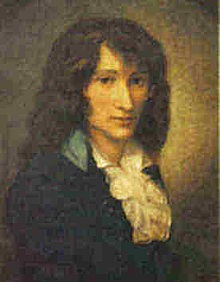

German composer. Müthel has always had a small, but secure, place in music history, due to his use of the word fortepiano, the first documented use of the term, in the title of his Duetto fur 2 Clavier, 2 Flugel, oder 2 Fortepiano (1771).
Johann Gottfried Müthel was born on January 17, 1728, in the town of Molln, near Hamburg. He was the fifth of nine children (six boys, three girls), and his father, Christian Caspar (1696-1764), was an organist and friend of Georg Philipp Telemann. At the age of six, young Müthel began music instruction with his father, first on the clavier, later on the violin and flute. After completing studies with his father, Müthel studied performance techniques and composition with Johann Paul Kunzen (1696-1757), a pupil of Christian Rau and Johann Kuhnau, in nearby Lubeck. At the age of 19, he was appointed chamber musician and organist to the court of Duke Christian Ludwig II (1683-1756) at Mecklenburg-Schwerin. His immediate predecessor at this post was his older brother Anton Christian (1725-1773), while a younger brother, Ernst Gottlieb (1703-1765), took over the job in 1753. At the Mecklenburg court, the social position of the organist was at the twentieth level along with the court painter and the gardener, one step above the forestkeeper and the dancing master, but one rank below the court trumpet player and drummer.
In May, 1750, the Duke granted Müthel a year's leave of absence to study with Johann Sebastian Bach in Leipzig. Although he lived in the Bach household, the length of study with the master of the Baroque was brief, since Bach died three months after Müthel's arrival. Müthel is often mentioned as Bach's last pupil, and he was present at the deathbed. Before returning to Mecklenburg-Schwerin, Müthel utilized his remaining leave time to travel and meet other composers. Moving to Naumberg, he studied for a short time with a son-in-law of Bach, Johann Christoph Altnikol (1719-1759). In the summer of 1751, he moved on to Dresden and became acquainted with the composer Johann Adolf Hasse. From Dresden, Müthel proceeded to the court of Frederick the Great at Potsdam and Berlin, where he became friends with C.P.E. Bach. The friendship between these two men would last a lifetime, and they corresponded on a regular basis.
In 1753 Müthel left Mecklenburg-Schwerin for the town of Riga in Latvia, where he joined his brother Anton Christian, now a lawyer and Attorney-General of the Superior Court of Justice in Riga. Another brother, the theologian Gottlieb Fredrich (1735-?), also moved to Riga in 1758. In 1756, a set of works for keyboard became the first compositions by Müthel to appear in print. Only a handful of pieces by the composer were published during his lifetime, the last being the Duetto in 1771. Müthel's skill as an organist earned him the post at the cathedral of St. Peter's in Riga, and he held the job from 1767 until his death in 1788.
Although Müthel was little known outside of Riga, he did gain the respect of the eminent English music scholar, Charles Burney. Burney mentioned Müthel several times, always favorably, in The Present State of Music in Germany, the Netherlands and United Provinces (1773, 1775), and A General History of Music (1776). In the former, Burney wrote:
M. Johann Gottfried Müthel of Riga, being by birth and education a German, deserves a place here, though he is at present established in a city which appertains to Russia. When a student upon keyed instruments has vanquished all the difficulties to be found in the lessons of Handel, Scarlatti, Schobert, Eckard, and C.P.E. Bach; and, like Alexander, laments that nothing more remains to conquer, I would recommend to him, as an exercise for patience and perserverence, the compositions of Müthel; which are so full of novelty, taste, grace, and contrivance, that I should not hesitate to rank them among the greatest productions of the present age... The style of this composer more resembles that of Emanuel Bach, than any other. But the passages are entirely his own, and reflect as much honour upon his mind as his hand. Indeed his writings abound with difficulties, which to common hearers, as well as common players, must appear too elaborate; for even his accompaniments are so charged as to require performers, for each instrument, of equal abilities to his own, which is expecting too much, in musicians of this nether world.
Not only was his music elaborate, but Müthel's opinions on composition were unique:
Generally I am dissatisfied with those composers who write on almost entirely without ceasing... If one would work more sparingly and only when the spirit is rested and has recovered and rid itself completely from previous thoughts, one would think and write in a novel and fiery manner, and dull and sleepy works would become more rare.
Müthel, along with C.P.E. Bach, was truly representative of the Sturm und Drang style of composition of German music of the mid-eighteenth century, both in his music and his lifestyle. However, his beliefs sometimes bordered on the eccentric, as exemplified in a passage published in 1782:
Also found here was an excellent clavier player named Müthel who, however, had his peculiar whims. One of them was that he would never perform other than in winter time when deep snow covered the streets, in order - as he said - not to be disturbed by the clatter of carriages passing by.